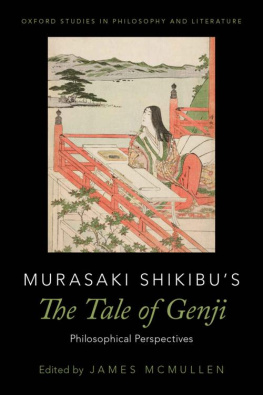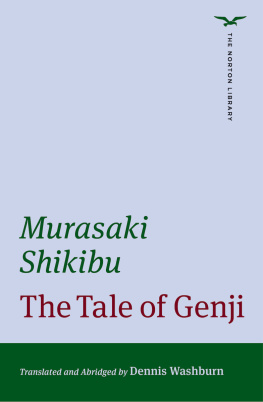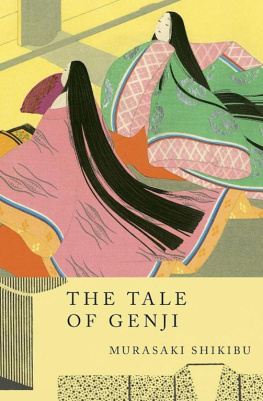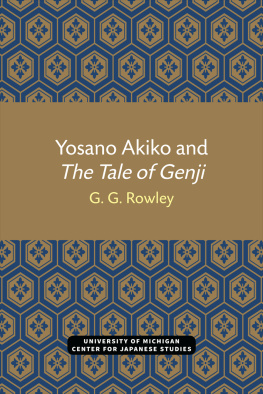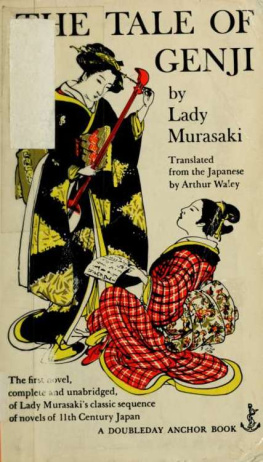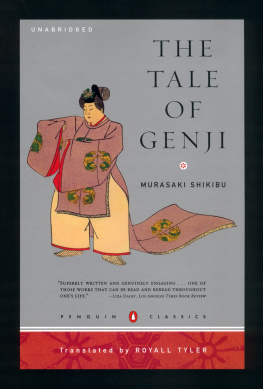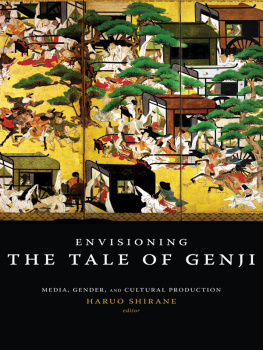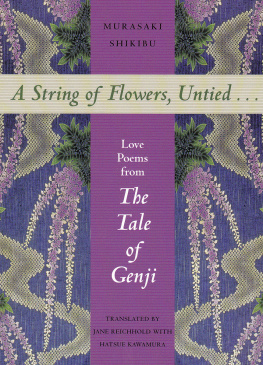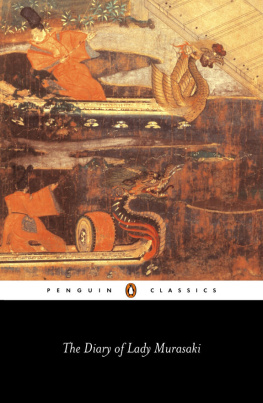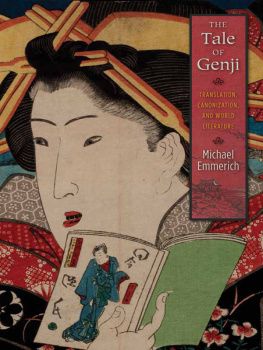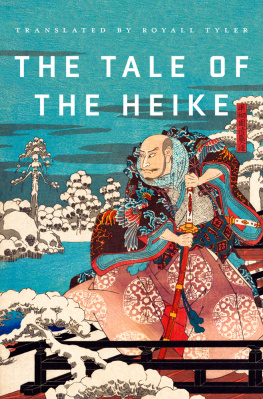MURASAKI SHIKIBUS THE TALE OF GENJI
OXFORD STUDIES IN PHILOSOPHY AND LITERATURE
Richard Eldridge, Philosophy, Swarthmore College
editorial board
Anthony J. Cascardi, Comparative Literature, Romance, Languages, and Rhetoric, University of California, Berkeley
David Damrosch, Comparative Literature, Harvard University
Moira Gatens, Philosophy, University of Sydney
Garry Hagberg, Philosophy, Bard College
Philip Kitcher, Philosophy, Columbia University
Joshua Landy, French and Comparative Literature, Stanford University
Toril Moi, Literature, Romance Studies, Philosophy, and Theater Studies, Duke University
Martha C. Nussbaum, Philosophy and Law School, University of Chicago
Bernard Rhie, English, Williams College
David Wellbery, Germanic Studies, Comparative Literature, and Committee on Social Thought, University of Chicago
Paul Woodruff, Philosophy and Classics, University of Texas at Austin
published in the series:
Ibsens Hedda Gabler: Philosophical Perspectives
Edited by Kristin Gjesdal
Shakespeares Hamlet: Philosophical Perspectives
Edited by Tzachi Zamir
Kafkas The Trial: Philosophical Perspectives
Edited by Espen Hammer
Austens Emma: Philosophical Perspectives
Edited by E. M. Dadlez
The Oedipus Plays of Sophocles: Philosophical Perspectives
Edited by Paul Woodruff
Murasaki Shikibus The Tale of Genji: Philosophical Perspectives
Edited by James McMullen
MURASAKI SHIKIBUS THE TALE OF GENJI
Philosophical Perspectives
Edited by James McMullen


Oxford University Press is a department of the University of Oxford. It furthers the Universitys objective of excellence in research, scholarship, and education by publishing worldwide. Oxford is a registered trade mark of Oxford University Press in the UK and certain other countries.
Published in the United States of America by Oxford University Press
198 Madison Avenue, New York, NY 10016, United States of America.
Oxford University Press 2019
All rights reserved. No part of this publication may be reproduced, stored in a retrieval system, or transmitted, in any form or by any means, without the prior permission in writing of Oxford University Press, or as expressly permitted by law, by license, or under terms agreed with the appropriate reproduction rights organization. Inquiries concerning reproduction outside the scope of the above should be sent to the Rights Department, Oxford University Press, at the address above.
You must not circulate this work in any other form and you must impose this same condition on any acquirer.
Library of Congress Cataloging-in-Publication Data
Names: McMullen, James, 1939 editor.
Title: Murasaki Shikibus The tale of genji : philosophical perspectives /
edited by James McMullen.
Description: New York : Oxford University Press, 2019. |
Includes bibliographical references and index.
Identifiers: LCCN 2018038471 (print) | LCCN 2018048448 (ebook) |
ISBN 9780190655013 (online content) | ISBN 9780190654993 (updf) |
ISBN 9780190655006 (epub) | ISBN 9780190654986 (pbk. : alk. paper) |
ISBN 9780190654979 (cloth : alk. paper)
Subjects: LCSH: Murasaki Shikibu, 978? Genji monogatari. | Philosophy in literature.
Classification: LCC PL788.4.G43 (ebook) | LCC PL788.4.G43 M68 2019 (print) |
DDC 895.63/14dc23
Contents
James McMullen
Royall Tyler
Wiebke Denecke
James McMullen
Edward Kamens
Tomoko Sakomura
Ivo Smits
Rajyashree Pandey
Melissa McCormick
At least since Plato had Socrates criticize the poets and attempt to displace Homer as the authoritative articulator and transmitter of human experience and values, philosophy and literature have developed as partly competing, partly complementary enterprises. Both literary writers and philosophers have frequently studied and commented on each others texts and ideas, sometimes with approval, sometimes with disapproval, in their efforts to become clearer about human life and about valuable commitmentsmoral, artistic, political, epistemic, metaphysical, and religious, as may be. Platos texts themselves register the complexity and importance of these interactions in being dialogues in which both deductive argumentation and dramatic narration do central work in furthering a complex body of views.
While these relations have been widely recognized, they have also frequently been ignored or misunderstood, as academic disciplines have gone their separate ways within their modern institutional settings. Philosophy has often turned to science or mathematics as providing models of knowledge; in doing so it has often explicitly set itself against cultural entanglements and literary devices, rejecting, at least officially, the importance of plot, figuration, and imagery in favor of supposedly plain speech about the truth. Literary study has moved variously through formalism, structuralism, post-structuralism, and cultural studies, among other movements, as modes of approach to a literary text. In doing so it has understood literary texts as sample instances of images, structures, personal styles, or failures of consciousness, or it has seen the literary text as a largely fungible product, fundamentally shaped by wider pressures and patterns of consumption and expectation that affect and figure in non-literary textual production as well. It has thus set itself against the idea that major literary texts productively and originally address philosophical problems of value and commitment precisely through their form, diction, imagery, and development, even while these works also resist claiming conclusively to solve the problems that occupy them.
These distinct academic traditions have yielded important perspectives and insights. But in the end none of them has been kind to the idea of major literary works as achievements in thinking about values and human life, often in distinctive, open, self-revising, self-critical ways. At the same time readers outside institutional settings, and often enough philosophers and literary scholars too, have turned to major literary texts precisely in order to engage with their productive, materially and medially specific patterns and processes of thinking. These turns to literature have, however, not so far been systematically encouraged within disciplines, and they have generally occurred independently of each other.
The aim of this series is to make manifest the multiple, complex engagements with philosophical ideas and problems that lie at the hearts of major literary texts. In doing so, its volumes aim not only to help philosophers and literary scholars of various kinds to find rich affinities and provocations to further thought and work, they also aim to bridge various gaps between academic disciplines and between those disciplines and the experiences of extra-institutional readers.
Each volume focuses on a single, undisputedly major literary text. Both philosophers with training and experience in literary study and literary scholars with training and experience in philosophy are invited to engage with themes, details, images, and incidents in the focal text, through which philosophical problems are held in view, worried at, and reformulated. Decidedly not a project simply to formulate As philosophy of X as a finished product, merely illustrated in the text, and decidedly not a project to explain the literary work entirely by reference to external social configurations and forces, the effort is instead to track the work of open thinking in literary forms, as they lie both neighbor to and aslant from philosophy. As Walter Benjamin once wrote, new centers of reflection are continually forming, as problems of commitment and value of all kinds take on new shapes for human agents in relation to changing historical circumstances, where reflective address remains possible. By considering how such centers of reflection are formed and expressed in and through literary works, as they engage with philosophical problems of agency, knowledge, commitment, and value, these volumes undertake to present both literature and philosophy as, at times, productive forms of reflective, medial work in relation both to each other and to social circumstances and to show how this work is specifically undertaken and developed in distinctive and original ways in exemplary works of literary art.

